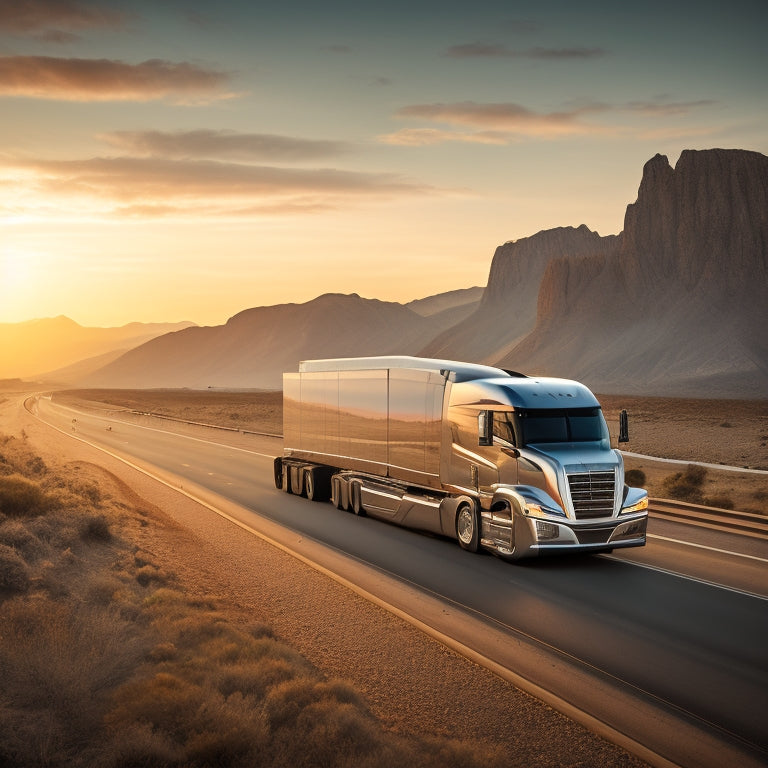
Revolutionizing Trucking: Meet the Ecascadia
Share
The eCascadia, a revolutionary electric truck, is poised to transform the trucking industry with its exceptional performance, efficient charging, and significant cost savings. Built on the aerodynamic Cascadia platform, it offers a range of 155, 220, or 230 miles, depending on battery capacity, and recharges from 0% to 80% in just 90 minutes. The eCascadia also promotes efficient turnaround times, streamlines fleet management, and reduces costs. With significant cost savings compared to diesel models, electric infrastructure enables financial benefits, grants, and incentives to offset the initial purchase price. Explore how the eCascadia can revolutionize your trucking operations.
Key Takeaways
• The eCascadia offers a range of 155, 220, or 230 miles based on battery capacity, making it suitable for short-haul routes.
• With a 438 kWh battery, the eCascadia can achieve a range of 230 miles (4x2) or 220 miles (6x4) on a single charge.
• The eCascadia recharges from 0% to 80% in 90 minutes, supporting efficient turnaround times for short-haul routes.
• The electric infrastructure of the eCascadia offers financial benefits through lower fuel costs and potential grants and incentives.
• The Detroit eConsulting team assists with EV rebates and infrastructure needs, ensuring a seamless transition to electric trucks.
Electric Performance and Design
The eCascadia's electric performance and design features, built on the aerodynamic Cascadia platform, guarantee superior performance and efficiency, making it an ideal choice for short-haul routes.
With a range of 155, 220, or 230 miles depending on battery capacity, the eCascadia offers flexibility for various operations. The 438 kWh battery enables a range of 230 miles (4x2) or 220 miles (6x4), ensuring reliable performance.
Aerodynamic efficiency is optimized through the Cascadia platform, reducing wind resistance and enhancing overall performance. The Detroit ePowertrain ensures maximum efficiency, power, and dependability, making the eCascadia an attractive option for fleets seeking to upgrade their operations.
Efficient Charging and Operations
With its ability to recharge from 0% to 80% in approximately 90 minutes, the eCascadia promotes efficient turnaround times for short-haul routes, thereby minimizing downtime and enhancing fleet productivity.
This rapid charging capability, enabled by smart technology, supports continuous operation with minimal interruptions. The Detroit eFill chargers, designed for durability and ease of use, guarantee efficient fleet operations.
Intelligent charging technology optimizes the charging process, streamlining fleet management and reducing costs. By leveraging rapid charging and smart technology, the eCascadia enables efficient operations, reducing downtime and increasing fleet productivity.
This results in increased customer satisfaction, improved logistics, and a competitive edge in the market.
Cost Savings and Support
Operating on electricity, the eCascadia offers a significant reduction in cost-per-mile compared to diesel fuel, resulting in substantial long-term savings. The electric infrastructure of the eCascadia enables financial benefits through lower fuel costs and reduced maintenance expenses. Additionally, grants and incentives may offset the higher initial purchase price, providing a Full Cost Analysis advantage.
Over time, electric trucks can achieve cost parity with diesel models. The Detroit eConsulting team assists with EV rebates and infrastructure needs, ensuring a smooth shift to electric fleets. With extensive service network support and intelligent charging technology, the eCascadia provides a cost-effective solution for short-haul routes, enhancing fleet productivity and profitability.
Frequently Asked Questions
How Does the Ecascadia's Battery Capacity Impact Its Overall Performance?
The eCascadia's battery capacity, with a 438 kWh battery, influences its overall performance, as higher energy density enables longer ranges, while charging cycles impact battery lifespan, necessitating intelligent charging technology to optimize performance and efficiency.
Are There Any Federal Tax Credits Available for Ecascadia Purchases?
"Did you know that 80% of eCascadia owners can benefit from federal tax credits? The U.S. government offers up to $40,000 in tax incentives for qualifying electric vehicle purchases, supporting green initiatives and reducing carbon footprints."
Can the Ecascadia Be Used for Long-Haul Trucking Operations?
While the eCascadia is designed for short-haul routes, its range limitations and recharge times may not be suitable for long-haul trucking operations, which require optimized route planning and an enhanced driver experience.
What Kind of Training Is Provided for Ecascadia Fleet Operators?
As the ancient Greeks sought to navigate uncharted waters, fleet operators commence on a new journey with the eCascadia, supported by thorough Operator Onboarding and Fleet Management training, ensuring seamless integration and optimized electric fleet operations.
Are There Any Specific Infrastructure Requirements for Ecascadia Charging Stations?
When designing eCascadia charging stations, consider Station Design for efficient energy distribution, ensuring the Power Grid can support high-capacity charging, Urban Planning for accessible locations, and Energy Storage solutions for peak performance.
Related Posts
-

3 Sun-Powered Automated Shades for Energy-Savvy Homes
You're looking to change your home into an energy-savvy haven, and sun-powered automated shades are an essential step...
-

What Do Power Strips Do for Standby Energy?
You're likely aware that your devices, such as TVs and computers, continue to draw power even when turned off, a phen...
-

What Water-Saving Gardens Complement Electric Vehicle Ownership?
As you pair your electric vehicle with a water-saving garden, you're not only reducing your carbon footprint but also...


